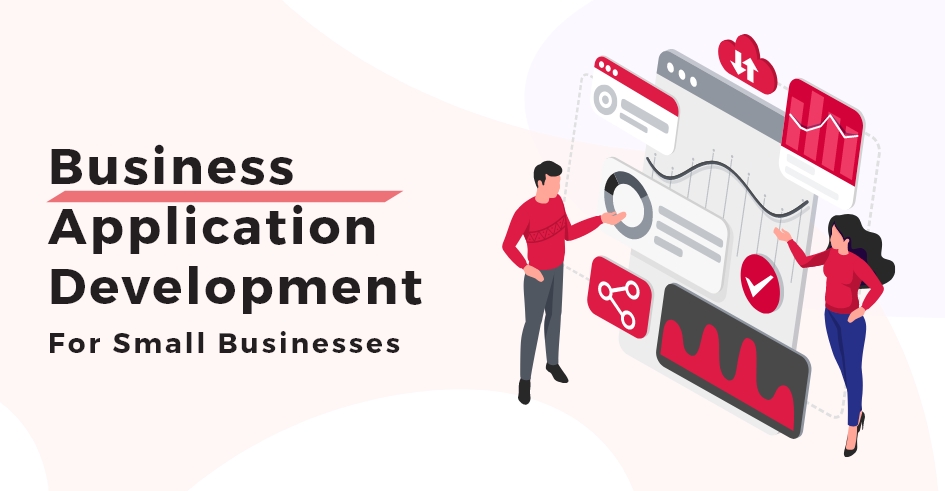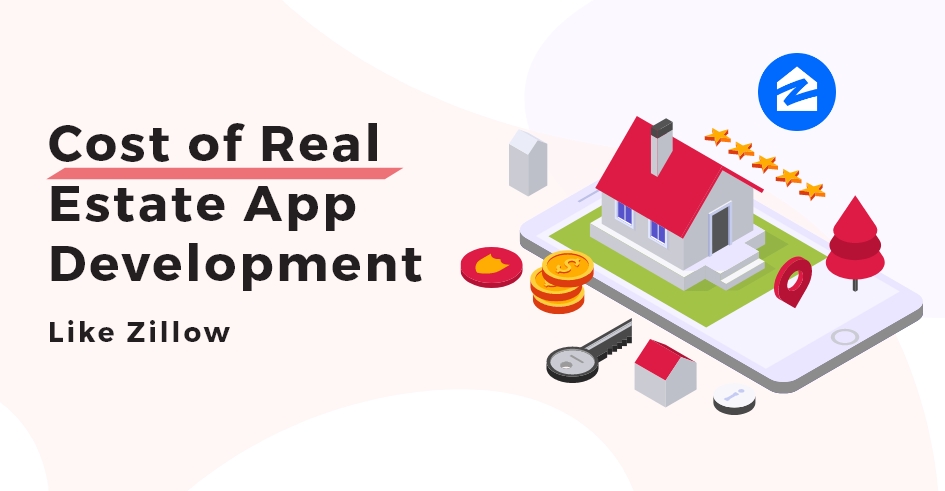Running a small business without the right tools is like navigating a ship without a compass—constantly battling inefficiencies, struggling to keep customers satisfied, and always feeling one step behind the competition. Sound familiar?
Running a small business without the right tools is like navigating a ship without a compass – you keep battling with inefficiencies, struggling to attain customer satisfaction, and always feeling like maybe, you’re not doing enough. Sounds like a day in your life?
The truth is –you’re not alone, an estimated 48% of the small businesses struggle to tackle their day-today activities and are investing custom app development. Their goal is just like yours – all they want is an enhanced operational efficiency, improved customer engagement and staying competitive in the ever-growing business market. With limited budget and resources, small business owners require smart solutions that can streamline their workflows and maximize their efficiency. That is exactly where business application development plays its role.
As a trusted mobile app development company in Dallas, we truly understand the significance of custom solutions that can drive efficiency and growth. This blog post is focused at exploring how business application development can help transform operations and help you attain success like never before.
What is Business Application Development?
Business application development is the process of creating software specifically designed to address a business’s needs and challenges. These applications are tailored to streamline operations, enhance efficiency, improve customer interactions, and drive business growth.
The development process involves several stages, including planning, designing, coding, testing, and deploying the application. As an outcome, a powerful tool is built that can not only streamline operations but also maximize efficiency and customer satisfaction with a guarantee of long-term business growth.
While there are a ton of off-the-shelf solutions available in the market, it is recommended that small businesses shall opt for custom applications. A custom business development application can offer unique system that aligns with your specific business needs and workflow and can be scaled as your business grows over time.
In addition to that, it can be a one-time expenditure saving you from a lot of recurring costs, unwanted features and limited options for customization that are a part of off-the-shelf solutions. It can also be easily integrated with your existing systems and help your business attain competitive edge by inculcating features that support customer engagement and enhanced efficiency.
Business Application Examples
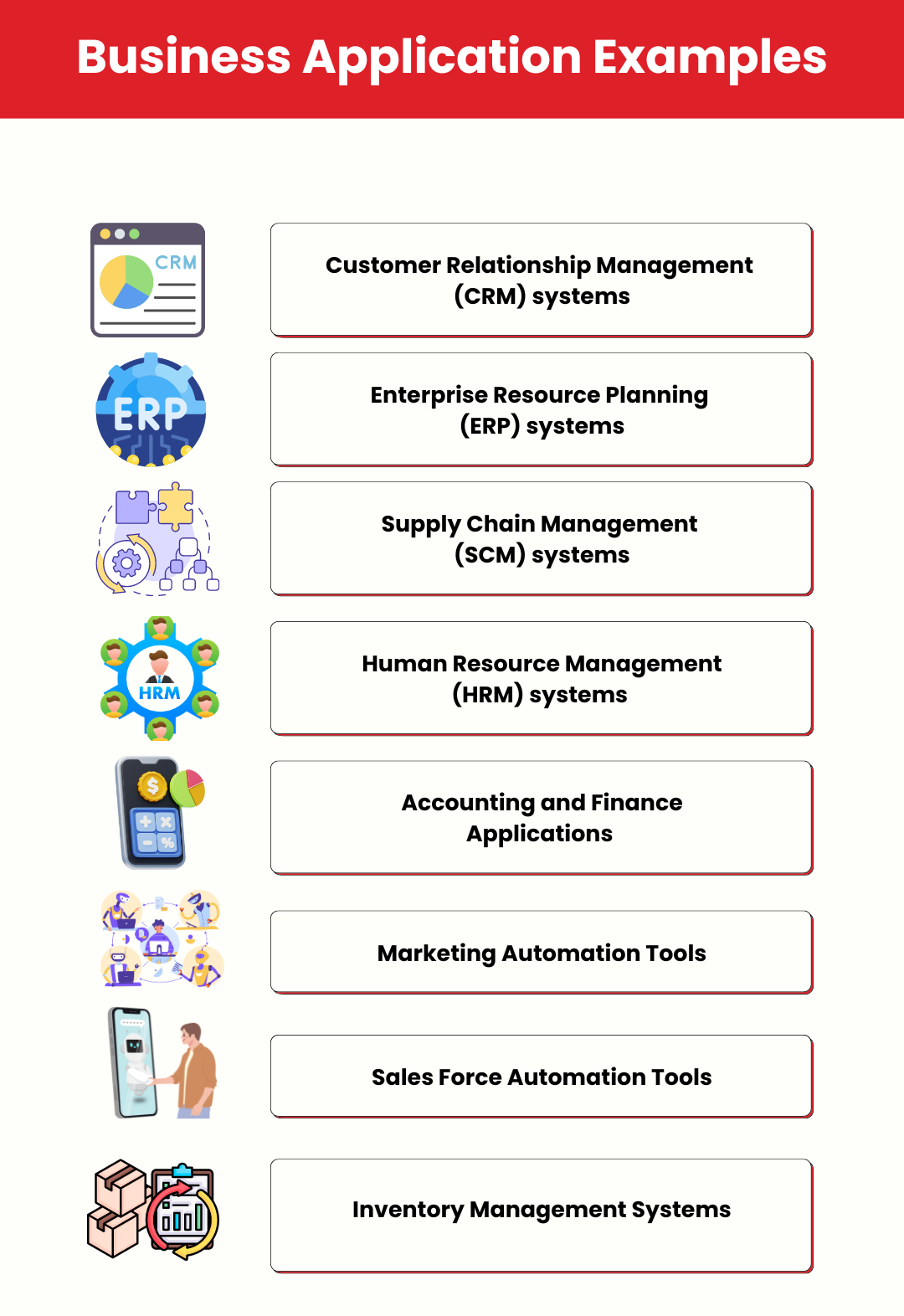
Some of the best business application examples are:
- Customer Relationship Management (CRM) systems
- Enterprise Resource Planning (ERP) systems
- Supply Chain Management (SCM) systems
- Human Resource Management (HRM) systems
- Accounting and Finance applications
- Marketing automation tools
- Sales force automation tools
- Inventory management systems
Understanding Your Business Needs
Every small business faces unique challenges. These hurdles can vary widely but often include managing inventory, tracking customer interactions, and maintaining financial records.
Recognizing these challenges is the first step toward finding effective business application solutions that work for you. Let’s take a closer look at some challenges small businesses often face and how business applications can address them:
1. Inventory Management
Keeping track of stock can be overwhelming without the right tools. Picture this: a small retail store owner spends hours each week manually counting inventory, a task that could be automated with the right app. Enter inventory management software, which automates stock tracking and helps prevent overstocking or stockouts.
2. Customer Relationship Management (CRM)
Maintaining good relationships with customers is essential for repeat business. Imagine a logistics company that has a fleet of drivers but struggles to keep track of their performance, routes, and schedules. A CRM system tailored for driver management can store this information, helping the company optimize routes, ensure timely deliveries, and provide better service to clients, thus enhancing customer loyalty.
3. Financial Management
Accurate bookkeeping and financial reporting are crucial for making informed decisions. Think of a freelance graphic designer juggling multiple projects and struggling to keep track of invoices and payments. Financial management apps simplify bookkeeping and reporting, freeing up time for the designer to focus on creativity.
How Business Applications Can Address These Challenges
Business applications are designed to streamline operations and provide efficient solutions to these challenges. For instance:
- Energy Management Software Solutions: These apps can help businesses monitor and reduce energy consumption, leading to significant cost savings.
- Driver Management App: Logistics companies can use such apps to track driver performance, optimize routes, and ensure timely deliveries.
- Commercial Real Estate App: Property managers can manage listings, track tenant issues, and handle maintenance requests all in one place.
Ready to unlock your business’s potential with custom business application development? Schedule a free consultation with us!
Types of Business Applications
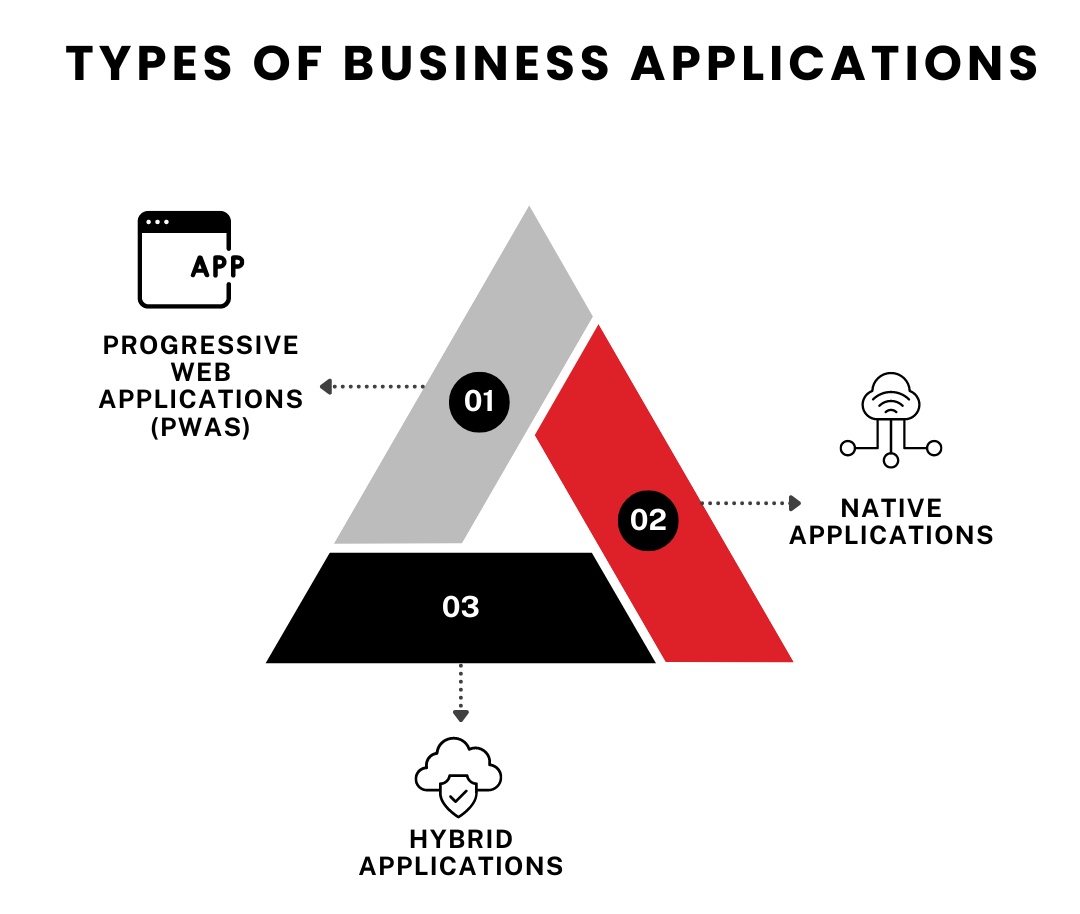
When developing a business application, understanding the different types of applications available will help you choose the right one for your small business. Let’s explore the various types, their advantages and disadvantages, and suitable use cases.
Native Applications
Native applications are developed specifically for a particular platform, such as iOS or Android, using platform-specific programming languages like Swift for iOS and Kotlin for Android.
Advantages
- Performance: Provide high performance and a smooth user experience because they are optimized for the specific platform.
- Access to Device Features: Fully utilize device features such as the camera, GPS, and push notifications.
- User Experience: Offer a superior user experience with better interface consistency.
Disadvantages
Developing separate apps for different platforms can be expensive and time-consuming. Each platform requires its own codebase, leading to higher maintenance efforts.
Examples and Use Cases
In retail app development, businesses can benefit from native apps that provide a seamless shopping experience. For instance, a clothing store can have an iOS app that leverages the device’s camera for virtual try-ons. Another example is Banking Apps. Banks often use native apps to ensure secure transactions and provide a range of functionalities like mobile deposits and personalized alerts.
Hybrid Applications
Hybrid applications are built using web technologies like HTML, CSS, and JavaScript. They are then wrapped in a native container that allows them to run on multiple platforms.
Advantages
- Cost-Effective: More cost-effective to develop as they use a single codebase for multiple platforms.
- Faster Development: Quicker development and deployment compared to native apps.
- Easy Updates: Updates can be rolled out across all platforms simultaneously.
Disadvantages
Due to their reliance on web technologies, hybrid apps may not perform as well as native apps and may not offer the same level of user experience, especially in terms of look and feel.
Examples and Use Cases
Small businesses, such as news agencies or blogs, can greatly benefit from hybrid apps. Business Application Development will allow them to deliver content across various platforms without the high development costs associated with native apps. Additionally, companies can deploy hybrid apps for internal use, like employee management or inventory tracking.
Progressive Web Applications (PWAs)
Progressive Web Applications (PWAs) are web applications that deliver a native app-like experience using modern web capabilities.
Advantages
- Accessibility: accessed from any device with a web browser, eliminating the need for installation.
- Cost-Effective: less expensive to develop and maintain compared to native and hybrid apps.
- SEO-Friendly: indexed by search engines, improving discoverability.
Disadvantages
PWAs cannot fully utilize all device features, such as advanced camera functionalities, and they may not perform consistently across all web browsers.
Examples and Use Cases
For businesses in the service industry, such as restaurants and salons, PWAs offer an excellent solution for online reservations and customer engagement. Similarly, small online retailers can benefit from PWA Business Application Development by providing a fast and accessible shopping experience without the hassle of app store downloads.
Recommendations for Small Business Needs
Choosing the right type of application depends on your business needs, budget, and target audience. Here are some recommendations:
- Opt for native apps for high-performance and feature-rich applications. These are ideal for businesses like banking, where security and performance are paramount.
- Consider hybrid apps for cost-effective, cross-platform solutions. They are suitable for small businesses that need to reach a broad audience quickly, such as content providers and internal business tools.
- PWAs are a great choice for accessible and budget-friendly options. They work well for businesses that prioritize accessibility and SEO, like service industries and small online retailers.
Understanding the types of business applications—native, hybrid, and PWAs—helps in making informed decisions about business app development.
Let’s dive into the benefits of business application development in the next section.
Benefits of Business Application Development
Business application development is a smart investment. It can yield great returns for businesses of all sizes. Tailoring software to specific needs unlocks a range of benefits. Let’s dive into how these applications drive growth, efficiency, and customer satisfaction.
Increased Efficiency and Increased Sales
Business Application Development can facilitate online shopping and offer a seamless buying experience. Business applications supercharge efficiency. They automate repetitive tasks, streamline workflows, and optimize resources. Thanks to automated invoice processing, an accountant is no longer buried in paperwork. Or imagine a customer service team using a case management system to swiftly resolve customer inquiries. It’s like switching from dial-up to high-speed internet.
Think about resource optimization. A manufacturing company might use an app to fine-tune production schedules, which means less wasted time and materials. It’s like the difference between cooking with a recipe and winging it.
Considering a mobile application for your business? Contact TechnBrains today for a free consultation! Our expert team can help you define your needs and develop a custom mobile application that drives results.
Enhanced Decision Making
Access to real-time data and analytics is a game changer. It lets businesses make decisions based on facts, not gut feelings. Think of a marketing team analyzing customer data to spot trends. It’s like Sherlock Holmes solving a mystery with solid evidence, not just a hunch.
Predictive analytics can forecast future trends. Imagine a financial institution using this to prevent loan defaults. It’s like having a crystal ball that actually works. Improved forecasting helps with planning and resource allocation. A retail company can avoid stockouts or overstocking by predicting demand accurately. It’s like having Spock’s logical precision.
Improved Customer Satisfaction
Business Application Development delivers personalized experiences, meeting specific customer needs and preferences. For example, an e-commerce platform might use customer data to recommend products. It’s like having a personal shopper who knows your style.
Efficient customer support systems boost satisfaction and loyalty. Picture a telecom company using a CRM to track interactions and provide consistent service. It’s like having a superpower for remembering every customer’s preferences.
Faster time-to-market means businesses can introduce new products quickly. A tech company using project management software might launch products faster. It’s like being The Flash in a world of slowpokes.
Gaining a Competitive Advantage
Business Application Development fuels innovation. It helps businesses create unique products, services, or models. Consider a FinTech company disrupting traditional banking with a peer-to-peer lending app—it’s like Netflix versus Blockbuster.
Business applications enhance agility. They help companies adapt to market changes quickly. A logistics company might use dynamic routing to optimize deliveries. It’s like having a GPS that updates in real time.
Scalability is another major perk. As businesses grow, their applications can grow, too. A cloud-based app can effortlessly handle fluctuating demands. It’s like having a wardrobe that expands as you buy more clothes.
Benefits for Small Businesses
Small businesses can reap significant benefits from business application development:
- Increased Productivity: Automating tasks and streamlining workflows can free up employees to focus on core business activities and drive growth.
- Improved Customer Service: Small businesses can compete with larger companies by providing exceptional customer service through tailored applications.
- Cost Reduction: By automating processes and reducing manual errors, small businesses can achieve significant cost savings.
- Data-Driven Decision-Making: Even with limited resources, small businesses can leverage data analytics to make informed decisions and optimize operations.
- Competitive Advantage: Custom applications can help small businesses differentiate themselves from competitors and capture market share.
Ready to see how business application development can transform your small business? In the next section, we’ll explore the development process.
The Business Application Development Process
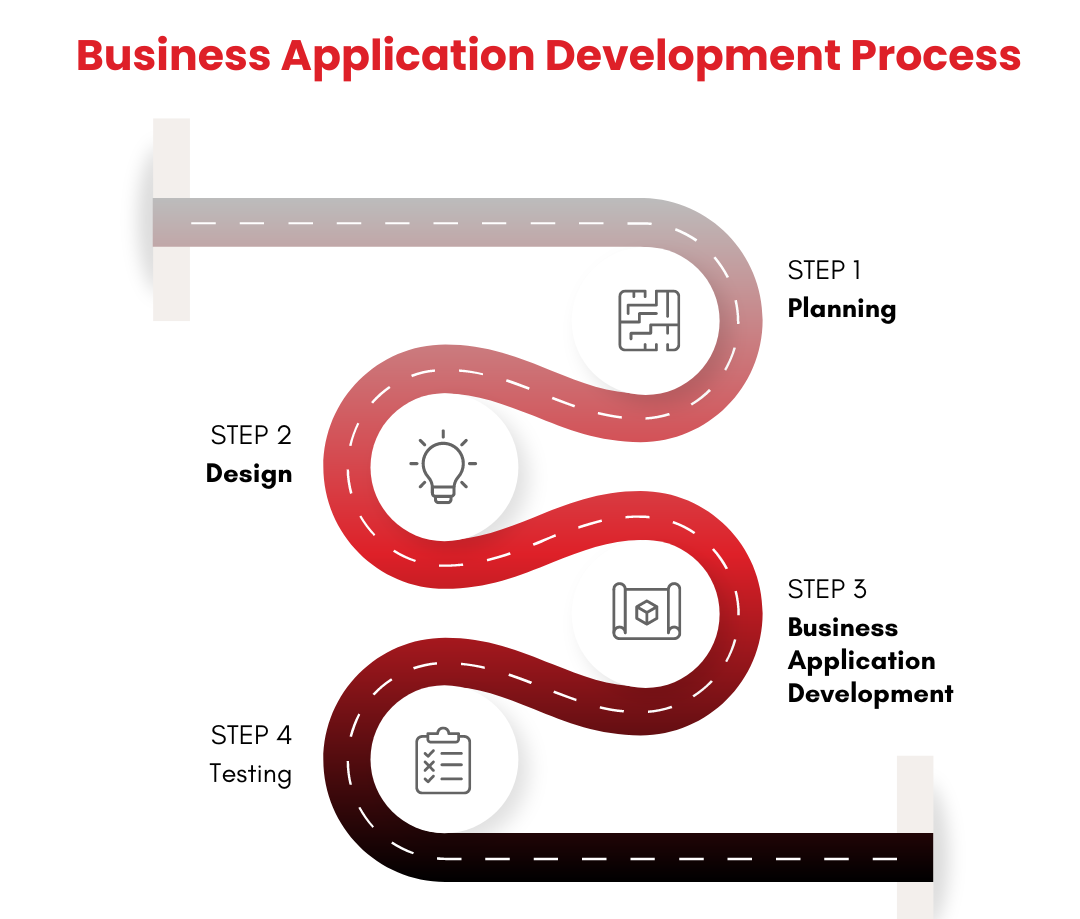
Developing a business application is a structured process involving several key stages: planning, design, development, testing, and deployment. Each stage is crucial, especially for small businesses looking to maximize their investment. Let’s break down each stage and see how it applies to mobile app development for small businesses.
Planning
Planning is the first and most crucial step. During this phase, businesses identify their goals, target audience, and key features for the app. For instance, a small restaurant might want a mobile app for online reservations, menu browsing, and customer feedback.
Tip: Create a detailed project roadmap. This will help keep everyone on the same page and set clear milestones. Engage stakeholders early to ensure their needs are met in Business Application Development.
Design
Design is where your ideas start taking shape. This phase involves creating wireframes and mockups to visualize the app. Think of it as sketching a rough draft before the final artwork of your Business Application Development.
Tip: Focus on user experience (UX). Ensure the app is intuitive and easy to navigate—test designs with real users to get feedback early on.
Business Application Development
Development is the stage where the actual coding happens. This is when your app transforms from a concept into a functional product. For a small retail store, this could mean developing features like a product catalog, shopping cart, and payment gateway.
Tip: Choose the right technology stack. For mobile apps, decide between native, hybrid, or PWA based on your needs. Review progress regularly and adjust as necessary.
Testing
Testing ensures the Business Application Development works as intended. It’s like proofreading a manuscript before publishing. This phase involves checking for bugs, performance issues, and usability problems. A small business offering delivery services might test its app’s GPS tracking and order management features.
Tip: Conduct thorough testing across different devices and operating systems. Use both automated and manual testing methods. Encourage beta testing to gather real-world feedback.
Deployment
Deployment is the final step. This is when the app goes live and becomes available to users. For a small boutique, this could mean launching the app on the App Store and Google Play. It’s like opening the doors of a new store.
Tip: Plan a smooth rollout. Monitor the app closely after launch for any issues. Gather user feedback and be prepared for updates and improvements.
How to Ensure a Smooth Development Process
Successful project management can make or break your app development project. Here are some tips that our business application developer for hire to ensure a smooth app process:
- Set Clear Goals: Define what success looks like. Set measurable objectives for each phase.
- Communicate Effectively: Maintain open lines of communication with your team and stakeholders. Regular updates help keep everyone aligned.
- Stay Flexible: Be prepared to pivot if necessary. Sometimes, initial plans need adjustments based on testing and feedback.
- Monitor Progress: Use project management tools to track milestones and deadlines. This keeps the project on schedule and within budget.
- Focus on Quality: Don’t rush the development process. Quality apps require time and attention to detail.
Key Characteristics of Business Application Development
Let’s break down the key aspects of business app development:
Purpose-Built
Business applications are built to meet a business’s unique requirements. Unlike off-the-shelf software, custom applications are designed to integrate seamlessly with existing processes and systems.
Scalability
Business Application Development is built with scalability in mind, allowing them to grow and evolve alongside the business. This ensures that the software remains relevant and effective as the company expands.
Integration
Business applications often need to integrate with other software systems, such as Customer Relationship Management (CRM), Enterprise Resource Planning (ERP), and accounting systems. Effective integration ensures smooth data flow and enhances overall efficiency.
Efficiency Boost
Business applications are designed to significantly enhance operational efficiency by Automating Repetitive Tasks. Routine and time-consuming processes like data entry, calculations, and report generation can be automated, freeing up human resources for more strategic tasks.
Defining clear steps and dependencies helps applications optimize the flow of work, reducing bottlenecks and delays. Many applications offer tools for real-time communication and collaboration, which enhance teamwork and productivity. Automation and standardization of processes can minimize human error, leading to improved accuracy and quality. Additionally, applications providing data-driven insights can help businesses allocate resources more effectively.
Data Management
Business Application Development is crucial for effective data management and utilization. They provide a central repository for storing and organizing large volumes of data from various sources. Authorized users can easily access and retrieve data when needed, improving decision-making speed.
TechnBrains develops business software with features to ensure data accuracy, consistency, and reliability. Robust security measures protect sensitive data from unauthorized access. Many applications offer data analysis tools to extract meaningful insights, identify trends, and support informed decision-making. Customized reports can be generated to provide stakeholders with relevant information.
Business App Development Companies to Hire in 2024
We stand out for our custom business application development company, tailoring solutions to meet specific organizational needs across various domains. Our innovative approach and commitment to quality ensure robust solutions that enhance operational efficiency and drive business growth. From initial consultation and design to development and deployment, TechnBrains provides comprehensive services that align perfectly with client objectives. Find more about business app development companies here.
Business Application Development: A Proven Success for Small Businesses
Investing into custom app development is truly becoming a game-changer for small businesses. A major percentage has already adapted to custom business applications and are enjoying improved customer engagement and efficiency. Studies reflect that companies leveraging from custom-built applications experience an average of 20% reduction in their operational costs and a 30% hike in their daily productivity.
Real-world examples truly showcase the impact: a company dealing with logistics has been able to reduce the delays in their delivery by over 25% using a custom driver management app while a real estate company manage to streamline their tenant operations with a reduced response time of 40% using a custom property management solution.
To cut it short – business applications are away lot more than just software – they are strategically designed tools focused at driving business growth. If you’re also willing to transform your operations and attain an unbeatable efficiency with a custom solution, TechnBrains is a top-tier mobile app development company in Dallas, dedicated towards transforming your vision into reality. Get in touch today for free consultation and take your business to the top.
Frequently Asked Questions (FAQs)
How much does it cost to develop a business application?
The cost of developing business applications depends on multiple features including, platform and complexity on top. On an average, the development of small business applications can be described as follows –
- $20,000 – $100,000 for basic applications
- $100,000 – $250,000+ for complex applications with advanced features and functionalities
How long does business app development take?
The exact timeline of business app development depends on the scope and complexity of your desired outcome.
- Basic applications take in between 2-4 months.
- Moderate apps with custom features and integrations take around 4-8 months.
- Complexed apps with real-time processing and AI integration can take 8+ months for completion.
What is the difference between a web app and a mobile app?
Web apps can be easily accessed via a browser, doesn’t require installation and are responsive across all devices.
Mobile apps require installation on an android/ios device, offer enhanced performance and can even function offline.
Hybrid apps are a combination of both, working across varying platforms with a single codebase.


